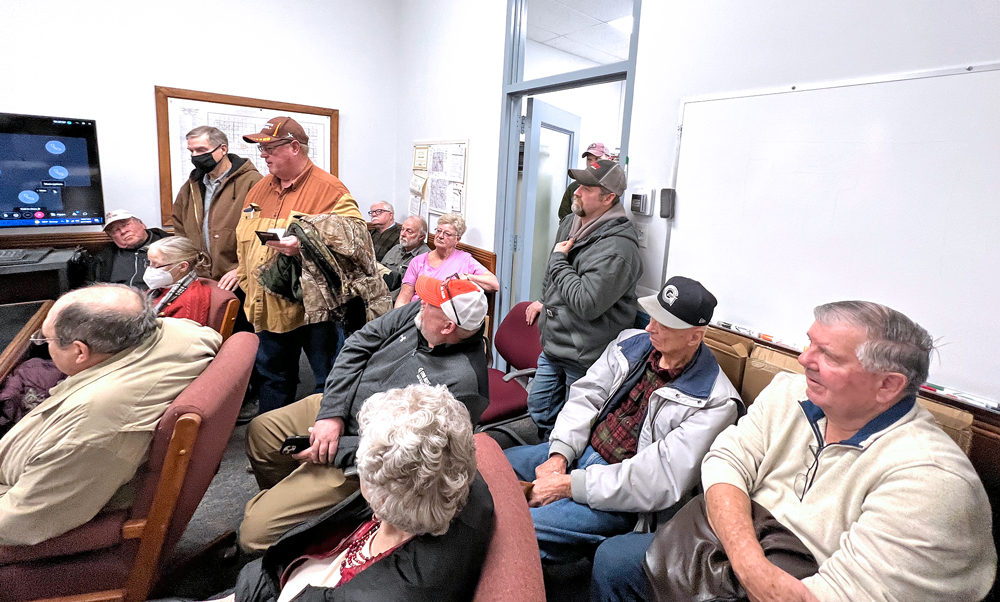Crowd asks Floyd County supervisors to oppose carbon dioxide pipeline plans


A large group of Floyd County landowners attended a Board of Supervisors meeting Monday morning, encouraging the board to take a stand against the carbon dioxide collection pipelines proposed to be built in Floyd County. From left behind the table are Floyd County Auditor Gloria Carr and Supervisors Linda Tjaden, Chair Doug Kamm and Roy Schwickerath. Press photo by Bob Steenson
By Bob Steenson, bsteenson@charlescitypres
A crowd of people squeezed into the board room at the Floyd County courthouse Monday morning to ask the county supervisors to officially oppose plans to build carbon dioxide pipelines through the county.
About two dozen rural county landowners showed up to express their opinions and to ask questions of two representatives of the Summit Carbon Solutions project who attended the meeting by telephone.
Most of the issues brought up were the same as those raised at the pipeline project public information meetings held last September in Floyd for the Summit project, and Jan. 24 at the county fairgrounds for a similar project by Navigator Energy Services.
The Iowa Utilities Board will decide whether to grant carbon dioxide pipeline permits to any of the three companies that have proposed them, and whether to grant the authority to the companies to use eminent domain to force easements where voluntary agreements with landowners cannot be reached.
The supervisors did not take any action on the discussion regarding filing a response with the Iowa Utilities Board, but said they would put it on the agenda for another meeting.
As supervisor Chair Doug Kamm noted, Floyd County is one of the few counties in the state where two of the pipelines want to build, and where they actually cross each other at one point.
Most of the people who expressed an opinion Monday were adamant that they didn’t think the private pipeline companies should be granted the authority to use eminent domain.
Chris Hill, director of environmental and permitting at Summit Carbon Solutions, who was one of the company representatives on the phone, said over and over that the company’s goal was to get 100% of the required pipeline easements voluntarily and avoid any use of eminent domain, but everytime he said that people in the crowd scoffed, some of them making comments that they would never agree to the project voluntarily.
Hill repeated the point several times that if people were not happy with the initial easement offers then they should tell Summit what they want.
“Stay off my land,” was one loud response from the crowd.
Hill would not discuss the percentage of landowners in the pipeline’s path who would not agree to easements, but he did say if that was a significant number then it would tell the company it needed to revise its easement agreements.
Hill also said eminent domain works both ways. For example, he said, an organization opposed to the project could buy strategic pieces of land and refuse to agree to an easement. Even if everybody else was in favor of the project, without eminent domain that one holdout could prevent the project from going through.
Several people had questions about the business model of the pipeline and what would happen if federal carbon dioxide storage tax credits – a large part of the revenue stream for the projects – went away if a less “progressive-liberal” administration came into power.
Hill said many of the carbon tax credit provisions were approved during the Trump administration, and they seem to have bipartisan support.
“Right now it’s 12 years we can plan to get the tax credits, and there are proposals to go to 20 years,” Hill said.
Hill said he hopes people will recognize the economic benefit of the pipeline project to the ag community in general and the ethanol industry in particular.
He said the ethanol industry has 10 to 15 years left if it can’t reduce its carbon index.
Hill also said Summit’s goal is not to be a pipeline company, but to be a carbon sequestration company, and that its next objective will be to work with farmers to help them monetize ways to sequester carbon in the ground through tillage and production practices, some of which they are already using.
Many of the people in the crowd were concerned about ag land where the pipe was buried returning to its former crop yield potential.
As part of the compensation for easements, Summit Carbon Solutions will pay landowners 100% of the value of their cropland yield on the easement land for the first year, 80% for a second year and 60% a third year.
They’ll get that money upfront, regardless of the actual impact to yields those years, and if that total 240% isn’t sufficient to cover the losses, Summit will pay the actual losses, Hill said.
Summit has said the goal – in fact the requirement of state law – is to return any ag land disturbed to its original condition, including saving and returning the same topsoil that was moved, returning the soil to its original compaction and restoring any drainage tiles that might be affected.
Still, people in the crowd were skeptical that was even possible.
A couple of people mentioned studies that have shown land disturbed by a pipeline doesn’t return to the same fertility five or even 10 years later. Another person said he had personal experience with a different kind of pipeline and you could tell in his field where the pipeline was laid, 10 years later.
Hill said Summit’s application for a pipeline permit, filed with the Iowa Utilities Board last month and available to the public on the IUB docket, includes a 34-page section on its agricultural impact mitigation plan.
He said the current state and federal standards are a result of some of those studies that people were citing, and they require inspectors to monitor the process throughout the installation and restoration process.
The inspectors are picked by each county board of supervisors, but Summit will pay the county for all the costs of the inspector and record-keeping, Hill said.
The issue of pipeline safety was also raised by several people.
Kathy Carter of Rockford noted that the pipeline will pass close to Rockford and she wondered about the response to a leak, since the nearest HazMat unit is in Mason City, and the Rockford Fire Department is a volunteer department with regular turnover.
Summit has said it will provide training and equipment to local departments to respond to a leak, but Carter asked if that will continue for the life of the pipeline.
“Absolutely,” Hill said.
He said the best way to deal with leaks is to prevent them, and he described ways the company ensures the pipeline is built correctly and is continually monitored, both remotely and regularly with flyovers and inspections of the ground where the pipe is buried.
Based on models of the dispersion of carbon dioxide in the event of a leak, the company is keeping the pipeline at least 500 feet from inhabitable structures, Hill said.
One woman said part of the problem is that people are hearing different things from different Summit representatives who are dealing with landowners, and others said that when they had questions no one from Summit got back to them.
After almost two hours of discussion, Supervisor Kamm said, “We get that everyone in this room is against it, but we represent everyone. We want to hear from everyone.”
It is unknown what impact a county supervisor resolution or statement against – or supporting – the project would have with the Iowa Utilities Board. About half of the 30 counties that the Summit pipeline will impact have filed statements with the IUB.
The decision on whether to grant a pipeline permit and whether to grant the use of eminent domain rests entirely with the Iowa Utilities Board. The IUB decision is subject to court review, however, if it is contested.
Also at the meeting Monday, the supervisors:
• Approved a notice that the board is not going to follow the recommendation of the Floyd County Compensation Board regarding supervisor salaries, choosing for the second year to take no pay increase.
For the fiscal year that begins July 1, the compensation board recommended increases of 12% for the county sheriff, 6% for the county attorney, auditor, recorder and treasurer, and 5% for the county supervisors.
The supervisors cannot increase the pay recommendations made by the compensation board, and can make reductions only if they reduce every elected official’s recommended salary by an equal percentage, except that they can reduce their own salary by any amount down to 0% increase, but they have to make that decision at least 30 days before the next fiscal year county budget is certified.
• Approved a resolution creating the position of full-time clerk, shared between the county Treasurer’s Office and the Recorder’s Office. Kim Usher had been a part-time clerk in the Recorder’s Office, and was appointed to the shared full-time position.
The Treasurer’s Office had a full-time deputy retire last year, and is realigning duties in the office. Longtime Treasurer Frank Rottinghaus has said he will not seek reelection in the November election.








Social Share